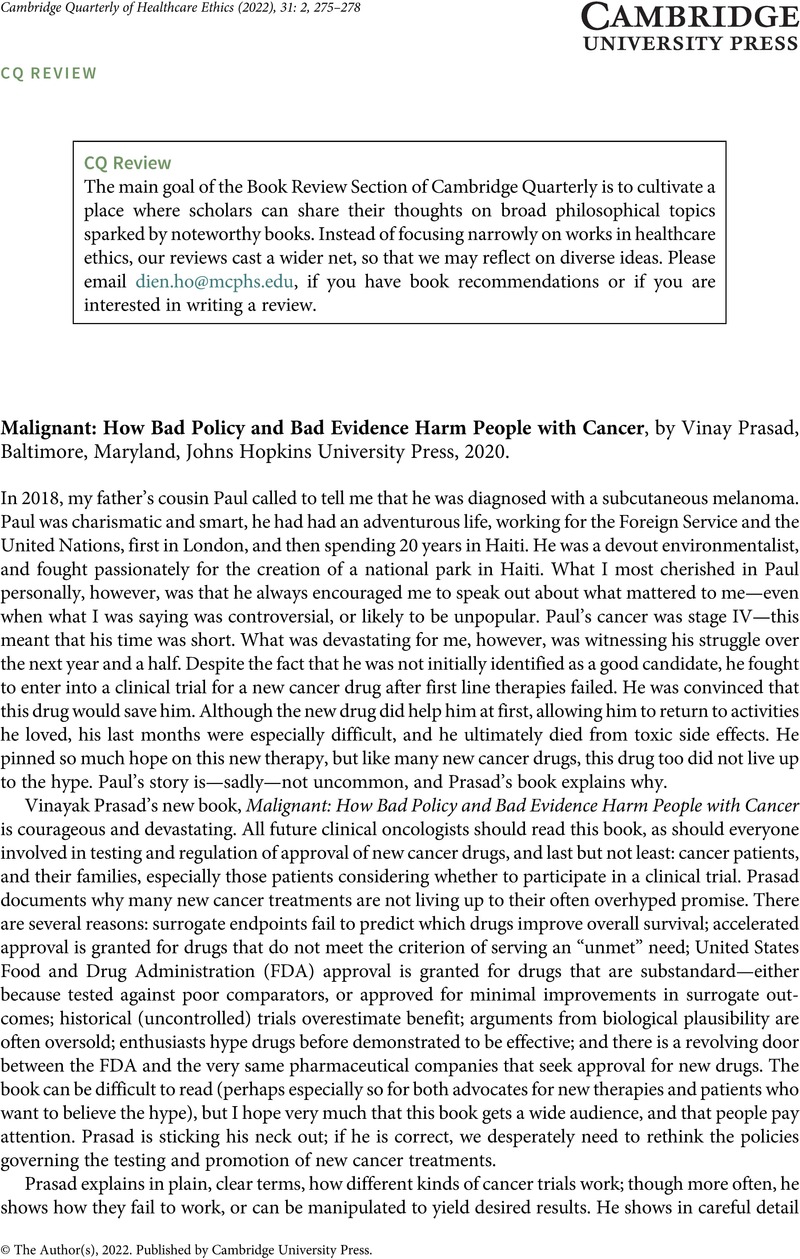No CrossRef data available.
Published online by Cambridge University Press: 04 March 2022

1. Prasad, V, Mailankody, S. How should we assess the value of innovative drugs in oncology? Lessons from cost-effectiveness analyses. Blood 2015;126(15):1860–1CrossRefGoogle ScholarPubMed.
2. Kim, C, Prasad, V. Cancer drugs approved on the basis of a surrogate end point and subsequent overall survival: An analysis of 5 years of US Food and Drug Administration approvals. JAMA Internal Medicine 2015;175(12):1992–4CrossRefGoogle ScholarPubMed.
3. See note 1, Prasad, Mailankody 2015.
4. Kemp, R, Prasad, V. Surrogate endpoints in oncology: When are they acceptable for regulatory and clinical decisions, and are they currently overused? BMC Medicine 2017;15(1):134 CrossRefGoogle ScholarPubMed.
5. Woloshin, S, Schwartz, LM, White, B, Moore, TJ. The fate of FDA postapproval studies. New England Journal of Medicine 2017;377(12):1114–17CrossRefGoogle ScholarPubMed.
6. Lu, E, Shatzel, J, Shin, F, an, Prasad V. What “unmet medical need” in oncology? An empirical evaluation of author usage in the biomedical literature. Seminars in Oncology 2017;44(1):8–12 CrossRefGoogle ScholarPubMed.
7. Abola, MV, Prasad, V. The use of superlatives in cancer research. JAMA Oncology 2016;2(1):139–41CrossRefGoogle ScholarPubMed.
8. Vera-Badillo, FE, Shapiro, R, Ocana, A, Amir, E, Tannock, IF. Bias in reporting of end points of efficacy and toxicity in randomized, clinical trials for women with breast cancer. Annals of Oncology 2013;24(5):1238–44CrossRefGoogle ScholarPubMed.
9. Boutron, I, Altman, DG, Hopewell, S, Vera-Badillo, F, Tannock, I, Ravaud, P. Impact of spin in the abstracts of articles reporting results of randomized controlled trials in the field of cancer: The SPIIN randomized controlled trial. Journal of Clinical Oncology 2014;32(36):4120–6CrossRefGoogle ScholarPubMed.
10. Bien, J, Prasad, V. Future jobs of FDA’s haematology–oncology reviewers. British Medical Journal 2016;354:i5055CrossRefGoogle ScholarPubMed.
11. Lammers, A, Edmiston, J, Kaestner, V, Prasad, V. Financial conflict of interest and academic influence among experts speaking on behalf of the pharmaceutical industry at the US Food and Drug Administration’s Oncologic Drugs Advisory Committee Meetings. Mayo Clinic Proceedings 2017;92(7):1164–6CrossRefGoogle Scholar.
12. Kaestner, V, Prasad, V. Financial conflicts of interest among editorialists in high-impact journals. Blood Cancer Journal 2017;7(9):e611–eCrossRefGoogle ScholarPubMed.
13. Hilal, T, Sonbol, MB, Prasad, V. Analysis of control arm quality in randomized clinical trials leading to anticancer drug approval by the US Food and Drug Administration. JAMA Oncology 2019;5(6):887–92CrossRefGoogle ScholarPubMed.
14. Del Paggio, JC, Azariah, B, Sullivan, R, Hopman, WM, James, FV, Roshni, S, et al. Do contemporary randomized controlled trials meet ESMO thresholds for meaningful clinical benefit? Annals of Oncology 2017;28(1):157–62CrossRefGoogle ScholarPubMed.
15. Hanahan, D, Weinberg, RA. The hallmarks of cancer. Cell 2000;100(1):57–70 CrossRefGoogle ScholarPubMed.